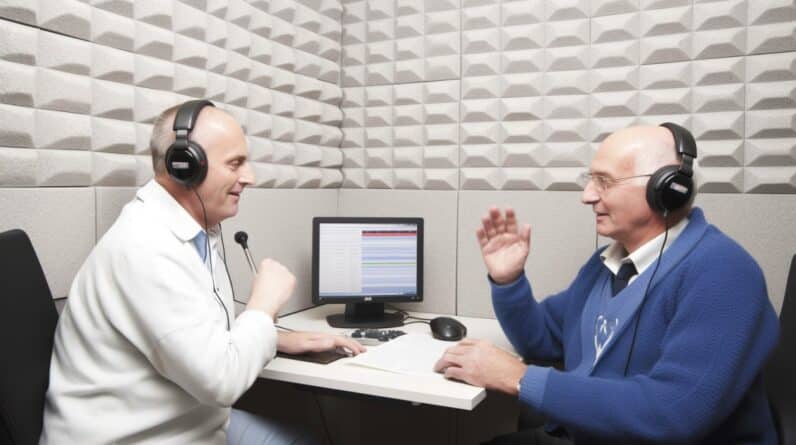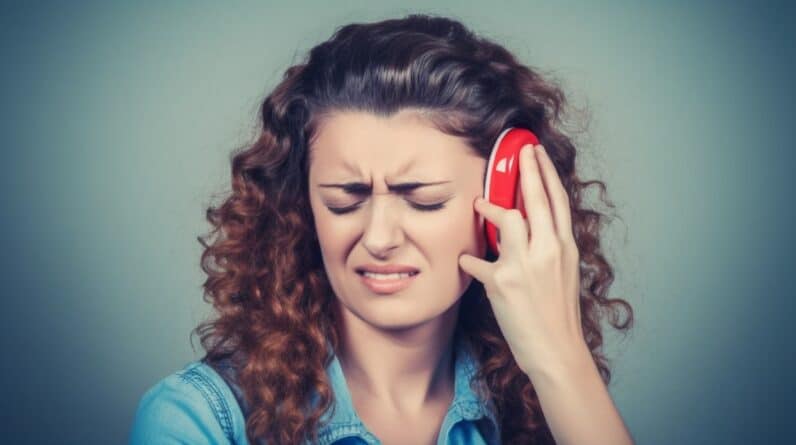
We may earn money or products from the companies mentioned in this post.
As an Amazon Associate I earn from qualifying purchases.
Introduction: Understanding Tinnitus
Have you ever experienced a ringing, buzzing, hissing or clicking sound in your ears? If so, you’re not alone. This symptom, known as tinnitus, affects about one in five people, according to the American Tinnitus Association (no-follow link). It’s a common problem that can occur due to various reasons, ranging from exposure to loud noises and age-related hearing loss, to more complex health issues like cardiovascular disease. The severity and impact on daily life varies for each individual, and for some, it may pose a significant challenge. However, don’t fret, a variety of treatments are available on pulsatiletinnitustreatments.com that can help manage this condition.
The good news is, while tinnitus can be annoying or persistent for some, it often isn’t a sign of a bigger health concern. But the question many folks grappling with these phantom noises often find themselves asking is whether tinnitus will ever go away on its own?
Types of Tinnitus
Understanding the different types of tinnitus is crucial to answering this query. In general, tinnitus is grouped into two main categories: subjective and objective.
Subjective tinnitus is more common, where the sounds are only heard by the affected individual. A myriad of conditions can cause subjective tinnitus, such as ear blockage, changes in ear bones, or a condition known as Meniere’s disease, amongst others. On the flip side, objective tinnitus is quite rare. Here, the doctor can also hear the sounds during an examination. This type is usually caused by blood vessel problems, muscle contractions or a condition in the middle ear bones.
There’s another type of tinnitus called pulsatile tinnitus which resonates with your heartbeat. Here you can find a detailed discussion on pulsatile tinnitus.
Each of these types varies in causes, symptoms, and treatments hence underscoring that tinnitus isn’t a one-size-fits-all kind of condition.
Now on to the million-dollar question: Can tinnitus go away by itself, and if it can, under what circumstances might that happen? So sit tight as we delve deeper into tinnitus, exploring conditions under which it might cease on its own and when and how you can take steps to treat it.
Will Tinnitus Go Away on its Own?
Here’s the bottom line. Tinnitus may or may not go away on its own, depending on its cause – a riveting fact, right? But let’s peel the onion a little further.
If the tinnitus is a result of a short-term exposure to a loud noise – say, a rock concert or listening to loud music on your headphones, there’s a good chance it will resolve on its own. Our ears have a remarkable ability to recover from temporary noise-induced trauma. So rest, avoid any further loud noise exposure, and your senses should rebound.
But when it comes to chronic tinnitus – the kind that persists despite your best efforts to silence it – the situation gets a tad more complex. If this tinnitus is caused by an underlying health condition like hearing loss, the tinnitus is likely here to stay unless the fundamental issue is addressed. If you’re wondering whether tinnitus can suddenly stop, there have been anecdotal reports of this happening. However, it’s usually the exception rather than the norm, and not something to rely on.
And here comes the twist. Seeing as tinnitus is subjective, and its impact largely depends on how it’s perceived, there’s a psychological aspect at play here. For some, tinnitus never really ‘goes away’, but they learn to habituate to it, to the point where it no longer disrupts their daily life. It’s like living near an airport – at first, the sound of the planes taking off and landing is all you can hear, but with time, you learn to tune it out.
In sum, whether tinnitus will dissipate on its own is intricately tied to its root cause, its duration, and your individual perception of it. But fear not, just because tinnitus may not vanish on its own doesn’t mean you’re left without options. Be it sound therapies, medications, CBT, or changes to your diet and lifestyle, a trove of potential treatments and strategies are within reach, as we will explore in the coming sections. So hang in there; there are several paths to explore on the journey to get rid of tinnitus.
Natural Remedies for Tinnitus
Fortunately for everyone dealing with tinnitus, there are multiple paths leading to potential relief. While living near an airport, for instance, you might have no control over the planes’ sound, but there’s a breadth of natural approaches you can employ to better manage the sounds in your head. Many people find great results using these methods, and while they might not cure tinnitus, they can significantly alleviate the symptoms and improve one’s quality of life. So, let’s shuffle through some of the naturals ways you can ward off the unwelcome orchestration of tinnitus.
Mindfulness and relaxation techniques: Stress and worry have a funny way of magnifying tinnitus. Did you know that relaxation techniques, such as deep breathing, yoga, meditation, and progressive muscle relaxation, can sidetrack your mind and deflect attention away from tinnitus? They help in stress management, which in turn can alleviate tinnitus symptoms.
Sound Therapy: Incorporating external noise to counterbalance the internal sounds can reduce the impact of tinnitus. Whether in the form of white noise, pink noise, nature soundtracks, or special tinnitus therapy sounds, sound therapy can be a useful tool. For a comprehensive guide on sound therapies, follow this link about Sound Generator for Tinnitus.
Exercises: For some, certain exercises focused on improving blood circulation like aerobics can help tinnitus. Neck exercises might be beneficial for those dealing with somatic tinnitus. Given the connection between tinnitus and stress, incorporating relaxation exercises becomes inevitable. There’s plenty of resourceful exercise information on Ear exercises for Tinnitus.
Healthy Eating: Making prudent dietary choices can go a long way in managing tinnitus. Certain foods notorious for heightening tinnitus include caffeinated drinks, alcoholic beverages, salt, and sugar. Undoubtedly, dietary changes might require some sacrifices, but hey, it could be your pathway for a serene mind, free from the symphony of tinnitus.
Together with these methods, a positive mindset showcasing patience and persistence will walk you a long way in your tinnitus journey. In short, if you want to learn how to relieve tinnitus naturally, casting your net wide will fetch you a multitude of strategies waiting for you to explore.
Medical Treatments & Therapies for Tinnitus
While natural remedies and lifestyle modifications create a robust defense against tinnitus, there exist an array of potent medical treatments and therapies that are worth exploring.
The therapeutic landscape of tinnitus is vast- ranging from medications like antidepressants and anti-anxiety drugs to minimize the negative emotional responses to tinnitus, to tinnitus retraining therapy (TRT) which involves retraining the auditory system. The aim here is to accept tinnitus sounds as natural rather than disruptive.
Think of it this way: instead of stumbling on the stones in your path, you use them to pave your road! Moreover, certain devices like hearing aids or sound-masking devices can also be used depending upon the underlying reason for tinnitus.
In some cases, treatments like the Hyperbaric oxygen therapy have shown promising results. It involves inhaling pure oxygen in a pressurized room to enhance the healing process, and many have found this beneficial in managing tinnitus. Sounds fascinating, right?
It’s important to remember that each person’s experience with tinnitus is unique, and what works for one might not be the solution for another. Therefore, it’s recommended that you have open discussions with your healthcare provider to find therapies that best suit your specific needs.
Living with Tinnitus
Unquestionably, living with a mysterious orchestra of sounds that no one else can hear might feel isolating at times, even more so when the conventional wisdom is that there is no cure. But believe it or not, many people have walked this path and found success, and the good news is – you can too!
While tinnitus might not vanish overnight, your life doesn’t need to be defined by it either. The ethos here is to learn to manage it, and who knows, you might even forget its existence after a while. Strategies like cognitive behavioral therapy can help change the way you think about and react to tinnitus. This psychological approach can reduce the distress, anxiety, and depression linked with tinnitus.
Additionally, self-help groups can also offer the necessary emotional support and bring a sense of reassurance that you are not alone in this journey. Want to learn more? Follow this enriching resource on how to live with tinnitus for a more detailed guide.
Conclusion: Key Takeaways
With tinnitus, the journey is the destination. While the query, ‘will tinnitus go away on its own’ might not have a one-word answer, it has undoubtedly unraveled a spectrum of strategies you can employ. It has highlighted that, yes, in some cases, tinnitus might resolve on its own, while in others, it needs some assistance, be it through natural therapies, medical treatments, lifestyle adjustments, or a blend of all.
Will Tinnitus Go Away On Its Own - Frequently Asked Questions FAQs
Can tinnitus go away by itself?
Tinnitus that results from a temporary exposure to loud noise usually subsides on its own after a short period. Chronic tinnitus triggered by underlying health issues like hearing loss or ear infection may require treatment.
How long does temporary tinnitus last?
Temporary tinnitus, often caused by exposure to loud noise, usually lasts a few minutes to 48 hours. However, it should gradually decrease over time.
What can exacerbate tinnitus?
Several factors can exacerbate tinnitus such as exposure to loud noise, certain medications, high levels of stress, and consumption of caffeine or alcohol.
What treatments are available for tinnitus?
Tinnitus treatments vary based on the underlying cause. They can include medications, sound therapy, cognitive behavioral therapy, tinnitus retraining therapy, and certain lifestyle changes.
Can certain foods or drinks trigger tinnitus?
Yes, some people find that caffeine, alcohol, sodium, and sugar can trigger or worsen their tinnitus. Maintaining a balanced diet can help manage the symptoms.
Amazon and the Amazon logo are trademarks of Amazon.com, Inc, or its affiliates.








